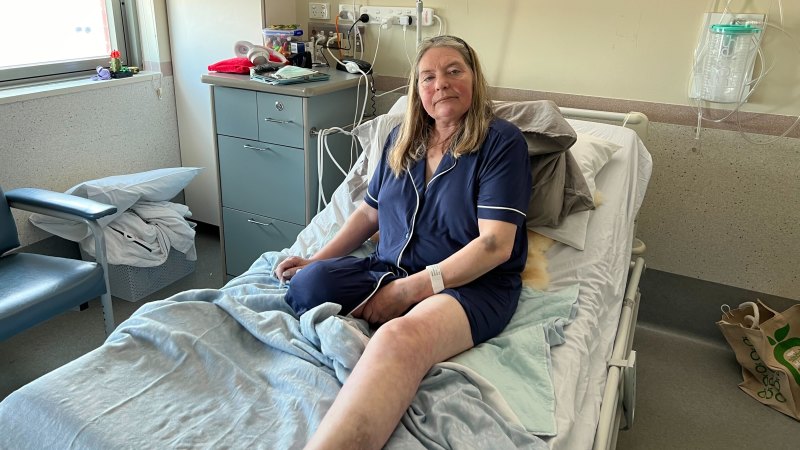Save articles for later
Add articles to your saved list and come back to them any time.
Ambulance Victoria has apologised after a woman waited about four hours for an ambulance while she suffered pain in her leg that later had to be amputated.
Marianne Maher, who lives in Haddon near Ballarat, said that two week ago she woke in the early hours with no feeling in her right foot, describing it as “dead looking”.
Marianne Maher is still recovering in hospital.
Maher, 53, said she felt disgusted that she was left waiting so long, suffering from pain in the part of her leg that retained feeling.
She said that shortly after she was picked up by paramedics, doctors at Ballarat Base Hospital discovered a blood clot and her right leg was amputated above the knee.
Ambulance Victoria executive director of operational communications Danielle North said a review of the case had begun to “better understand the circumstances”.
“Ambulance Victoria apologises for the time it took to respond to this patient and any distress this has caused,” she said.
“We have reached out to the family and are committed to providing them with answers and assistance as we progress with this review.”
Maher, a mother of two, said she woke about 5am on November 15 to go to the toilet and discovered she was unable to bear weight on her right leg.
“I put my left foot down and my right foot wouldn’t go down, so I fell flat on the ground, and I sort of dragged myself to the lounge room, and tried to wake up my partner Nick and my adult son, who was down from the Northern Territory,” she said.
“I was sort of screaming for them, and they finally woke up and then called an ambulance.
“I couldn’t feel anything in my foot, but in my leg I was in pain. I had pins and needles … I was sweating. I was hot and cold.”
Maher, an office clerk for a panel beating company, said that in the first of a series of calls made to emergency services that morning, Nick told an ambulance dispatcher that she could not feel her foot.
Maher said she later spoke directly to an ambulance call taker.
“I was screaming at them,” she said. “I was absolutely screaming at them, saying, ‘I need an ambulance here now … I can’t feel my foot, I can’t feel anything’.”
It was not until after 9am – about four hours after the initial triple-zero call – that paramedics arrived, said Maher, who is still in hospital in Ballarat.
Ambulance response times have fallen below the official target since the pandemic.
Eighty five per cent of code-one patients are meant to be reached within 15 minutes. In July to September this year, only 66 per cent of cases were reached within this benchmark.
Over the same period, it took an average of 43.3 minutes to reach code-two cases, up from 25.2 minutes in July to September 2019, just before COVID-19 emerged.
Last week, it was reported at least 20 people had died during preventable ambulance dispatch delays in Victoria since 2020.
Maher’s case is yet to be classified as a sentinel event, meaning it’s not yet considered a serious and preventable instance of patient harm, although it remains under review.
There were no call-answering delays in the case, according to Victoria’s triple-zero answering service, the Emergency Services Telecommunications Authority (ESTA).
“Triple-zero operators process calls based on information provided by each caller based on protocols determined by the responder agency,” an ESTA spokesperson said.
“When a caller requests ambulance assistance, triple-zero operators process the information provided to determine the most appropriate response, which can include the dispatch of an ambulance or a referral to a clinician in Ambulance Victoria’s Secondary Triage.”
An earlier investigation by The Age revealed ambulance delays had been exacerbated by extreme overcrowding at hospitals, with paramedics forced to wait hours for patients who cannot be admitted to clogged emergency departments. Paramedics had spent a cumulative 120 years waiting for sick or injured patients to be admitted to overcrowded hospitals over five years.
Paramedics have also reported they are being tied up with patients with relatively minor ailments, such toothaches, constipation, and blocked ears, preventing them from getting to more serious incidents on time.
Get the day’s breaking news, entertainment ideas and a long read to enjoy. Sign up to receive our Evening Edition newsletter.
Most Viewed in National
From our partners
Source: Read Full Article



